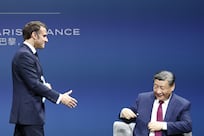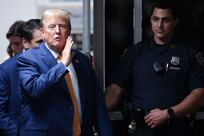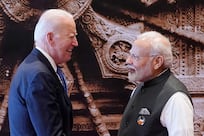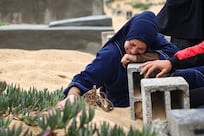The instant it became clear that Nigeria’s election was a success, with the gracious concession of incumbent president Goodluck Jonathan to his rival Muhammadu Buhari, the flood of praise rolled in. Mostly, it has to be said, it came from the foreign press and from Western officials, for the example Nigeria had set for the African continent.
It is true that a peaceful handover after an incumbent’s election defeat is relatively unusual in African states, although not as rare as the stereotype holds. And with several presidents currently seeking to tinker with their constitutions to let them serve additional terms, Mr Jonathan’s dignified exit sends a strong counter-message.
But while this new status as a democratic role model has worth, there are more urgent forms of leadership for Nigeria to offer once Mr Buhari takes office on May 29.
For too long Nigeria has been a kind of inverse regional leader in West Africa: poised to lead by the size of its population and economy, but becoming instead a source of dysfunction with adverse security and economic effects on its neighbours.
A new regime in Abuja offers a chance to reboot relations with its partners in the Economic Community of West African States (ECOWAS) and non-ECOWAS neighbours Chad and Cameroon, and turn Nigeria into a constructive leader – the kind that drives development and builds collective security.
So far this year, regional cooperation with Nigeria has most visibly taken the form of putting out security fires on Nigeria’s own soil, as Chad, Cameroon and Niger have joined in the fight against the Boko Haram insurgency. At times, this has looked more like cooperation in spite of Nigeria.
The Nigerian military has operated separately from the other nations’ joint coordination cell. Chad’s president, Idris Deby, has complained that the Nigerian army does not show up to take control of towns that his troops liberate. Nigeria’s military has trumpeted breakthrough progress against Boko Haram on its own, but has allowed the press almost no access to verify its claims.
Mr Buhari, a retired general who scored landslide wins in the insurgency-plagued states – where long queues of displaced people waiting to vote at polling stations made for some of the election’s most moving images – is likely to bring fresh vigour to the counter-insurgency. He should also work more pragmatically with his neighbours’ armies, and the French and US who support them.
But Mr Buhari and his team will first have to assess the true extent of the campaign thus far – and find out just how bad is the crisis of under-equipment, poor morale, and corruption in military procurement.
In the past, Nigeria’s army was the one that supported others, not the reverse. But the most-cited example of Nigeria’s leadership – the regional force that helped end civil wars in Liberia and Sierra Leone – took place in the 1990s, now long ago.
The geography of threat in West and Central Africa has shifted. Nigeria still supplies peacekeepers, in particular in Mali, but has had to limit deployments due to the security crisis back home.
Nor has Nigeria done much to lead the response to illicit trans-Sahara trade that sustains jihadis and insurgents who threaten the entire region.
Nigeria frustrates its neighbours perhaps even more on the economic front.
With Africa’s largest GDP, a major financial hub in Lagos, a vibrant middle class, and a top tier of ultra-rich oil tycoons and industrialists, it should be an engine of trade and investment across West Africa.
Instead, it has prevented adoption of uniform tariffs in ECOWAS, sheltering inefficient local industry while feeding a huge regional illicit economy. Goods of all kinds – cars, textiles, rice – come in while subsidised fuel goes out.
Dysfunction in its energy sector has had a spillover effect, notably in Ghana, where insufficient natural gas from the pipeline that links the two countries has contributed to an electricity supply crisis. There are plans to link Nigeria’s power grid to more of its neighbours, but Nigeria’s own power supply situation is catastrophic.
An expressway from Lagos across Benin, Togo, and Ghana to Abidjan, Côte d’Ivoire, is on the cards, but the Nigerian stretch has yet to clear Lagos’s city limits.
There has been little progress in the other countries either, but given Nigeria’s heft, it should be spurring these infrastructure developments – maybe even financing them.
For now, many new ventures in the region are smaller-scale and avoid Nigeria. A new railway line is under construction between Niger and Benin, and another has been revamped between Burkina Faso and Côte d’Ivoire. An aviation hub has formed in Lomé, Togo.
In Nigeria, the Jonathan campaign touted the relaunch of various rail services during his administration, but these are slow, delay-plagued trains. Why not think big, and imagine a regional high-speed rail system, driven by the Nigerian market?
For now, Nigeria is mostly looking within. As in other large countries, foreign policy played little part in the election, which was fought less on contrasting programmes than on traits of leadership, accountability, and record, mixed with ethnic and regional dynamics.
Regional heads of state have welcomed Mr Buhari, for now, with traditional formal congratulations.
But public sentiment is keen. For decades, people across West Africa have looked to Nigeria with a mix of admiration and frustration. Nigeria has soft power potential too: its pop music, for instance, is sweeping the continent, including the francophone countries.
It took a former president, Ghana’s Jerry Rawlings – another military ruler of the 1980s who turned into a civilian democrat – to frame in grandiose but heartfelt terms Nigeria’s leadership opportunity. Nigerians had voted for integrity, Mr Rawlings said; now it was up to Buhari and team to deliver.
“General Buhari owes it to his people and to Black Africans, the restoration of our pride and the black man’s dignity,” Mr Rawlings said. A tall order for anyone – but well within reach of Nigeria’s assets and imagination.
Siddhartha Mitter is a freelance journalist specialising in West Africa
Twitter: @siddhmi





